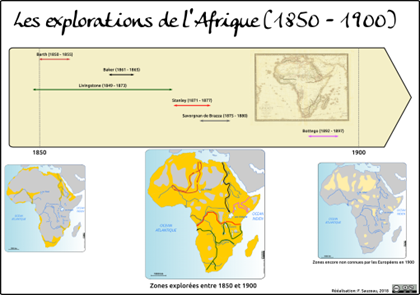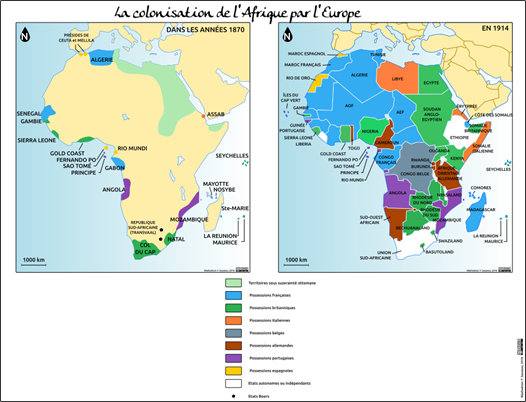Africa still has the reputation of being an “unhealthy continent”, affected by diseases such as malaria, filariasis, onchocerciasis (river blindness), trypanosomiasis (sleeping sickness), leprosy, and yellow fever. Before venturing into exploration, travelers undergo rigorous training. In 1854, the discovery of quinine helped facilitate the conquest and colonization of Africa.
At the end of the 18th century, the spirit of the moment in Europe, in addition to abolitionism, was also that of scientific curiosity – which justified exploration – and that of cultural imperialism – which pushed to evangelize populations while trading -; it was the “theory known as the “three Cs” which consisted of associating the terms civilization, commerce and Christianity to make them the foundations of colonial ideology.” Alongside abolitionist societies, exploration societies (the African Association for example, founded in 1788 in England) and missionary societies (such as the London Missionary Society, created in 1795) appeared at this time. In the early 19th century, the interior of Africa remained largely unexplored and geographical or ethnographic information concerning the continent was very old; When René Caillié set out to discover Timbuktu, which he reached in 1828, “the last information concerning the city dated from the 16th century and came from the accounts of Leo Africanus.” Under English impetus, the end of the 18th century and then the 19th and beginning of the 20th century saw the creation of major expeditions, financed by missionary societies, exploration societies, major newspapers and states. At the same time, Christian missions were being established en masse throughout the continent; there were a few at the beginning of the 19th century, and there were dozens of them by the end of the same century.
Explorations and missions do not only have disinterested, scientific and evangelizing aims; in fact, an exploration “often precedes colonial takeovers.” A notable example of the phenomenon, at the end of the 19th century, Leopold II of Belgium sponsored several expeditions, including one led by the explorer Henry Morton Stanley, who created the Congo Free State in 1885, which would become the personal property of the king.
For more information :
- https://fr.wikipedia.org/wiki/Portail:Afrique
- https://en.wikipedia.org/wiki/Africa
- https://africacenter.org/
- https://journals.openedition.org/etudesafricaines/
- https://etudes-africaines.cnrs.fr/
- https://journals.openedition.org/etudesafricaines/
- https://www.afdb.org/fr/documents-publications/economic-perspectives-en-afrique-2024


